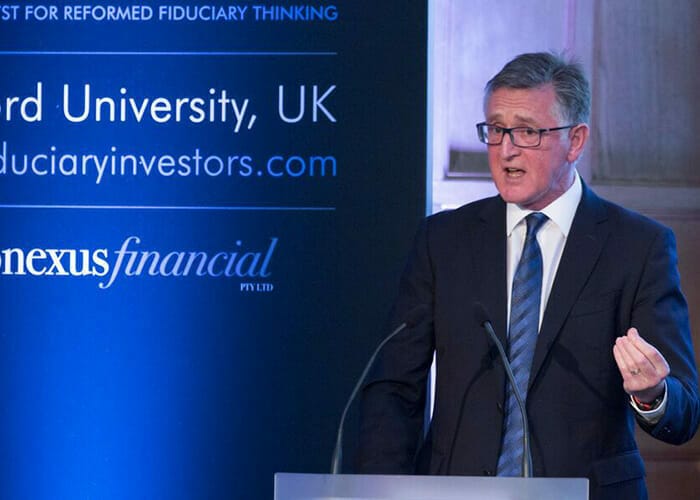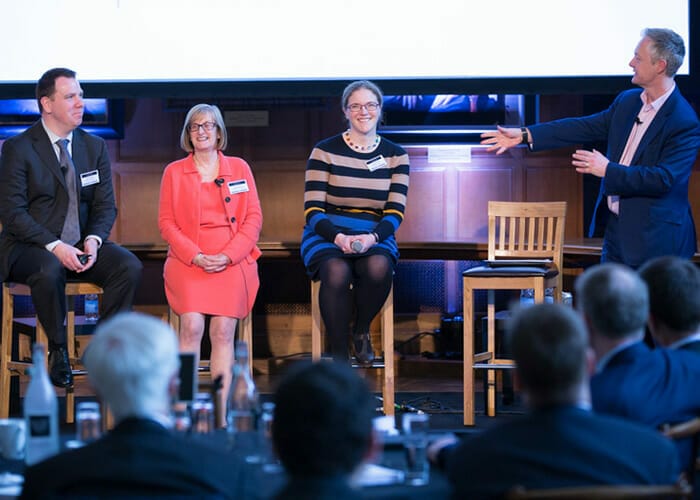More than 1000 people died in Bangladesh’s worst industrial accident when the eight-storey Rana Plaza garment factory near Dhaka collapsed in 2013. Many of the workers, aware that the factory was unsafe, had gone on strike in protest but had returned to the ill-fated building because they had been given an ultimatum to come back to work or lose their jobs.
Since the disaster, worldwide labour federation UNI Global Union, based in Switzerland, has successfully campaigned for independent inspections of factories in Bangladesh. For Philip Jennings, general secretary of UNI, the incident was a tragic example of why investors need to do more to protect workers’ rights by putting pressure on investee companies to safeguard their supply chains.
“Take a stand and be active,” Jennings said, during a rousing speech at the Fiduciary Investors Symposium at the University of Oxford. “Say, ‘No, we are not accepting this.’ ”
Jennings asked delegates to give non-government organisations and unions a fair hearing and improve on their governance.
“Very often, we feel we are being nudged aside,” he said. “Take us seriously. You’ve got a voice, use it.”
After the Rana Plaza tragedy, a powerful coalition of global investors called for big clothing retailers to help the victims and families of factory workers. The move was led by the Interfaith Center on Corporate Responsibility, a group of 275 institutional investors, with more than $4 trillion in assets under management, seeking social change.
It’s the kind of thing Jennings wants to see more of. He argued that investors share with unions a common interest in protecting workers’ welfare.
“My members are your members,” he said.
To him, it means investors should help improve workers’ rights in countries that have denied collective bargaining and union membership – part of what he called a rise of anti-democratic forces. The issue is not limited to emerging economies; investor influence on investee companies’ treatment of unions is just as important in developed nations. In the US, Walmart, the country’s largest private-sector employer, has a long history of stopping union membership amongst its 1.3 million employees.
Jennings set out the scale of the problem facing today’s workers. He estimated that about 3.2 billion people were in the global workforce, 1 billion in vulnerable contracts with no certainty of earnings. He cited 150 million children in work and 40 million in slave labour. Also, the number of people in vulnerable jobs is set to grow, he said; 192 million are unemployed, and extreme poverty in emerging economies without social safety nets has left millions without.
“People are living in poverty,” he said. “No wonder people are angry. The [proportion of] working poor in Europe is 1 in 10.”
Jennings also said many workers had been misclassified as freelancers or self-employed, in what he called a slide to the bottom for rights and earnings. In the US, 16 per cent of workers are self-employed.
He urged investment in companies that have a social purpose and encouraged robust due diligence on issues such as human rights, child labour and gender parity. Investors also had a role to play in boosting employment in infrastructure and new, green economies, where employment opportunities run into tens of millions, he said.
Jennings warned that workers felt angry and forgotten, and were insecure about wages and threats such as technology taking their jobs. He called for an end to what he called an assault on the institutions aiming to help workers and warned of the consequences for economies, social cohesion and democracy if unions’ role in the global economy were to be diminished.
“It is up to us to decide what future we want,” he said.




